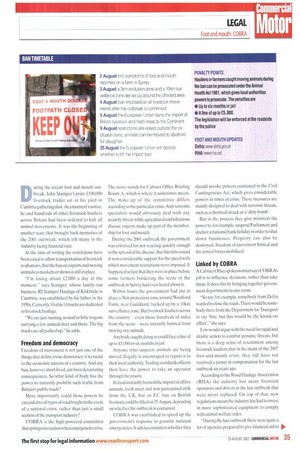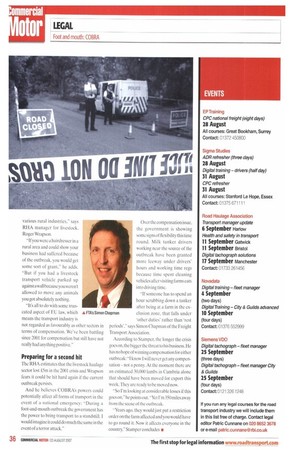D uring the recent foot and mouth outbreak. John Stamper's prize
Page 35

Page 36

If you've noticed an error in this article please click here to report it so we can fix it.
£100,000 livestock trailer sat in his yard in Cumbria gathering dust. At a moment's notice. he and hundreds of other livestock hauliers across Britain had been ordered to halt all animal movements. It was the beginning of another scare that brought back memories of the 2001 outbreak, which left many in the industry facing financial ruin.
At the time of writing the restrictions have been eased to allow transportation of livestock to abattoirs. But the ban on exports and moving animals to markets or shows is still in place.
-I'm losing about £2,000 a day at the moment.says Stamper, whose family-run business, RI Stamper Haulage of Kirkbride in Cumbria, was established by his father in the 1950s. Currently 10 °fits 14 trucks are dedicated to livestock haulage.
"We are just running around in little wagons carrying a few animals here and there. The big trucks are all parked up," he adds.
Freedom and democracy Freedom of movement is not just one of the things that define a true democracy: it is crucial to the economic success of a country. And any ban, however short-lived, can have devastating consequences. So what kind of body has the power to instantly prohibit such traffic from Britain's public roads?
More importantly, could those powers be extended to all types of road freight in the event of a national crisis, rather than just a small section of the transport industry?
COBRA is the high-powered committee that springs into action when emergencies arise. The name stands for Cabinet Office Briefing Room A, which is where it sometimes meets. The make-up of the committee differs according to the particular crisis. Anti-terrorist specialists would obviously deal with any security threat, while agricultural and infectious disease experts make up part of the membership for foot and mouth.
During the 2001 outbreak the government was criticised for not reacting quickly enough to the spread of the disease. But this time round it won considerable support for the speed with which movement restrictions were imposed. It happened so fast that they were in place before some farmers bordering the scene of the outbreak in Surrey had even heard about it.
Within hours the government had put in place a 3km protection zone around Woolford Farm, near Guildford, backed up by a 10km surveillance zone. But livestock hauliers across the country even those hundreds of miles from the scene were instantly banned from moving any animals.
Anybody caught doing so could face a fine of up to £5,000 or six months in jail.
Anyone who suspects animals are being moved illegally is encouraged to report it to their local authority. Trading standards officers then have the power to take an operator through the courts.
Ireland instantly banned the import of all live animals, fresh meat and non-pasteurised milk from the UK, but an EC ban on British livestock could be lifted on 25 August. depending on whether the outbreak is contained.
COBRA was established to speed up the government's response to genuine national emergencies. It advises ministers whether they should invoke powers contained in the Civil Contingencies Act, which gives considerable powers in times of crisis. These measures are mainly designed to deal with terrorist threats, such as a chemical attack or a 'dirty bomb'.
But in the process they give ministers the power to, for example, suspend Parliament and declare a national hank holiday in order to shut down businesses. Property can also be destroyed, freedom of movement limited and the armed forces mobilised.
Linked by COBRA A Cabinet Office spokeswoman says COBRA's job is to influence decisions, rather than take them. It does this by bringing together government departments in one room.
"So say, for example, somebody from Defra wanted to close the roads. There wouldbe somebody there from the Department for Transport to say 'fine, but this would he the knock-on effect'," she says.
Few would argue with the need for rapid and drastic action to combat genuine threats. but there is a deep sense of resentment among livestock hauliers that in the midst of the 2007 foot-and-mouth crisis, they still have not received a penny in compensation for the last outbreak six years ago.
According to the Road Haulage Association (BHA) the industry lost many livestock operators and drivers in the last outbreak that were never replaced. On top of that, new regulations mean the industry has had to invest in more sophisticated equipment to comply with animal welfare rules.
"During the last outbreak there were quite a lot of agencies prepared to give financial aid to PI" various rural industries," says RHA manager for livestock, Roger Wrapson.
"If you were a hairdresser in a rural area and could show your business had suffered because of the outbreak, you would get some sort of grant," he adds. -But if you had a livestock transport vehicle parked up against a wall because you weren't allowed to move any animals you got absolutely nothing.
-It's all to do with some truncated aspect of EL; law, which A FTA's Simon Chapman means the transport industry is not regarded as favourably as other sectors in terms of compensation. We've been battling since 2001 for compensation but still have not really had anything positive."
Preparing for a second hit
The RHA estimates that the livestock haulage sector lost £5m in the 2001 crisis and Wrapson fears it could be hit hard again if the current outbreak persists.
And he believes COBRA's powers could potentially affect all forms of transport in the event of a national emergency: -During a foot-and-mouth outbreak the government has the power to bring transport to a standstill. I would imagine it could do much the same in the event of a terror attack." Over the compensation issue, the government is showing some signs of flexibility this time round. Milk tanker drivers working near the source of the outbreak have been granted more leeway under drivers' hours and working time regs because time spent cleaning vehicles after visiting farms eats into driving time.
"If someone has to spend an hour scrubbing down a tanker after being at a farm in the exclusion zone, that falls under 'other duties' rather than 'rest periods'." says Simon Chapman of the Freight Transport Association.
According to Stamper, the longer the crisis goes on, the bigger the threat to his business. He has no hope of winning compensation foreither outbreak:"! know twill never get any compensation not a penny. At the moment there are an estimated 30,000 lambs in Cumbria alone that should have been moved for export this week, They are ready to be moved now.
"So I'm looking at considerable losses if this goes on,he points out. -Yet I'm 350 miles away from the scene of the outbreak.
"Years ago, they would just put a restriction order on the farm affected and you would have to go round it. Now it affects everyone in the country," Stamper concludes •
























































































































































































